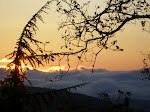The next day some of the dancers came back by Gunts hamlet on their way home to the other side of the mountain ridge. One of the young men was sporting an extra-wide bark belt over which he had folded a fine loin cloth netted with bark fiber interspersed with light-colored possum fur. The fact that he was unfamiliar with photography did not hamper his proud self-presentation to us - the first white-skinned people to live for any length in the area.
His hair was carefully shaped in the form that marked young men during a period of initiation. In the Maring language this treatment of the hair was called mamb ngunt'. The place of the mamb ngunt' in Maring society was explored by Roy A. Rappaport in his book Pigs for the Ancestors (1984:202)
We appreciated the quality of the young man's armband (ant'ipa) and his tubular woven belts, all made by local men from wild orchid fibre. These were given as gifts to each other and to the women of their families. What was a complete surprise to us, and, indeed, we never saw another example, was the bunches of possum whiskers that he had attached to the ends of a chain of tiny woven circles that hung from the heavy strands of trade beads around his neck. To get a photograph which included as many of the items of his finery as possible, we asked him to toss the possum whiskers over his shoulder.
Not only did we never again see possum whiskers used as decoration, we never even saw a live or dead possum that could have grown such wonderful whiskers.
<>>><>>><>








